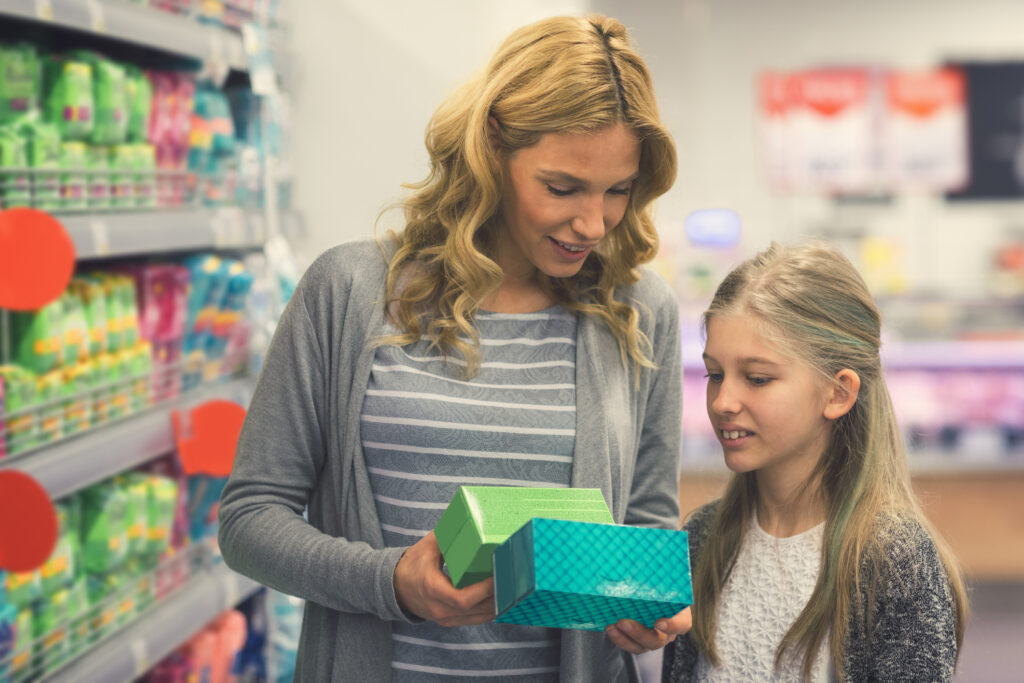Be prepared for accidents, Keep a spare pair of underwear at school. Strategies to help my daughter manage period cramps at school. How can I help my daughter manage her period at school? | What are some strategies to help my daughter manage period cramps at school?
How can I help my daughter manage her period at school?

To help your daughter manage her period at school, here are some tips:
- Prepare a period kit: Equip her with a discreet period kit for her school bag, including pads, spare underwear, zip-close bags for soiled items, and wipes.
- Know what’s normal: Explain that the first three periods might be irregular, and a typical cycle is within 21-45 days. If she needs more than six to eight pads a day or experiences severe pain, consult a doctor.
- Keep supplies handy: Suggest she keeps pads, period-proof underwear, tampons, or a menstrual cup in her school and sports bags.
- Know school resources: Find out if the school stocks period supplies, if they are free, and if there are limits. Also, know the school’s policy on painkillers and excused gym class for period symptoms.
- Offer support: Encourage her to offer help to friends and classmates in similar situations and normalize periods among her friends.
- Track her cycle: Help her track her period to anticipate her needs and manage supplies.
- Discuss options: Talk about different collection methods and let her choose what she’s comfortable with, ensuring she knows how to use them correctly.
- Practice at home: If she wants to use tampons or a menstrual cup, practice inserting and removing them between periods.
- Be prepared for accidents: Keep a spare pair of underwear at school.
- Encourage open communication: Create an environment where she feels comfortable discussing her period and any concerns.
- Ongoing conversations: Engage in small, ongoing discussions about periods rather than one formal talk.
What are some strategies to help my daughter manage period cramps at school?
Here are some strategies to help your daughter manage period cramps at school:
- Gentle exercise and stretching: Encourage light activities like walking or stretching to increase blood flow and reduce tension. Gentle stretches or a quick walk around the school can help relieve pelvic pain. Yoga poses like Cobra, Cat, Cow, and Fish can also be beneficial.
- Heat therapy: A small, portable heat pack or warm water bottle can offer quick relief when placed on her lower belly. If the school has a microwave, she can warm a heat pack. A warm washcloth can also work.
- Comfortable clothing: Suggest wearing loose-fitting clothes that don’t put pressure on her belly.
- Supportive period products: Thinx Teen’s period underwear can provide reliable leakproof protection for up to 12 hours and is designed for comfort.
- Relaxation techniques: Deep breathing, meditation, or listening to music can help ease discomfort. Finding a quiet spot in the library or another peaceful area for relaxation can also be helpful.
- Pain relief medication: Muscle relaxant pain medication like ibuprofen or naproxen taken with food can help with cramps.
- Hydration: Sipping water can help.
- Discourage missing school: Encourage her to continue her daily routine and not fall behind in classes.
- Warm baths: Warm baths can help relax muscles that may be causing pain.
How do Female soldiers manage their Periods / Bathroom situations at War zones?
How can I encourage my daughter to talk to her friends about menstruation?
To encourage your daughter to talk to her friends about menstruation, consider these strategies:
- Normalize menstruation: Help her view periods as a normal and natural part of life. By normalizing the topic at home, you can reduce any awkwardness she might feel about discussing it with others.
- Share your experiences: Talk about your own experiences with menstruation in a light and positive way. This can make the topic more approachable and relatable for her.
- Encourage open conversations: Create an environment where she feels comfortable discussing her period and any concerns she has. Let her know she can approach you whenever she wishes to.
- Provide accurate information: Make sure she is well-informed about menstruation, hygiene, and related health issues. The more knowledgeable she is, the more confident she’ll be in discussing it with others.
- Discuss supporting each other: Talk about how girls can support each other during their periods. Discuss how she feels about starting her period, and how girls can support each other through this time.
- Talk to boys about periods: Inform all people of everyday health facts and normalize women’s health. Don’t be afraid to talk to your sons about periods as well as your daughters.
- Use everyday moments: Prompt conversations in everyday contexts, like when you see a sanitary pad advertisement or are folding laundry that includes a bra.
- Address misinformation: If she has picked up any wrong information from her peers, correct it.
- Promote positive language: Avoid using negative terms like “a curse” when talking about periods. Use specific words like ‘vagina’ and ‘uterus’ openly instead of being embarrassed or using slang phrases.
- Lead by example: Be open about women’s health and wellness and encourage your daughter to feel comfortable talking to medical professionals.
- Small Conversations: Break it into multiple ongoing conversations instead of one “big talk”. This helps normalize menstruation and removes any awkwardness.

